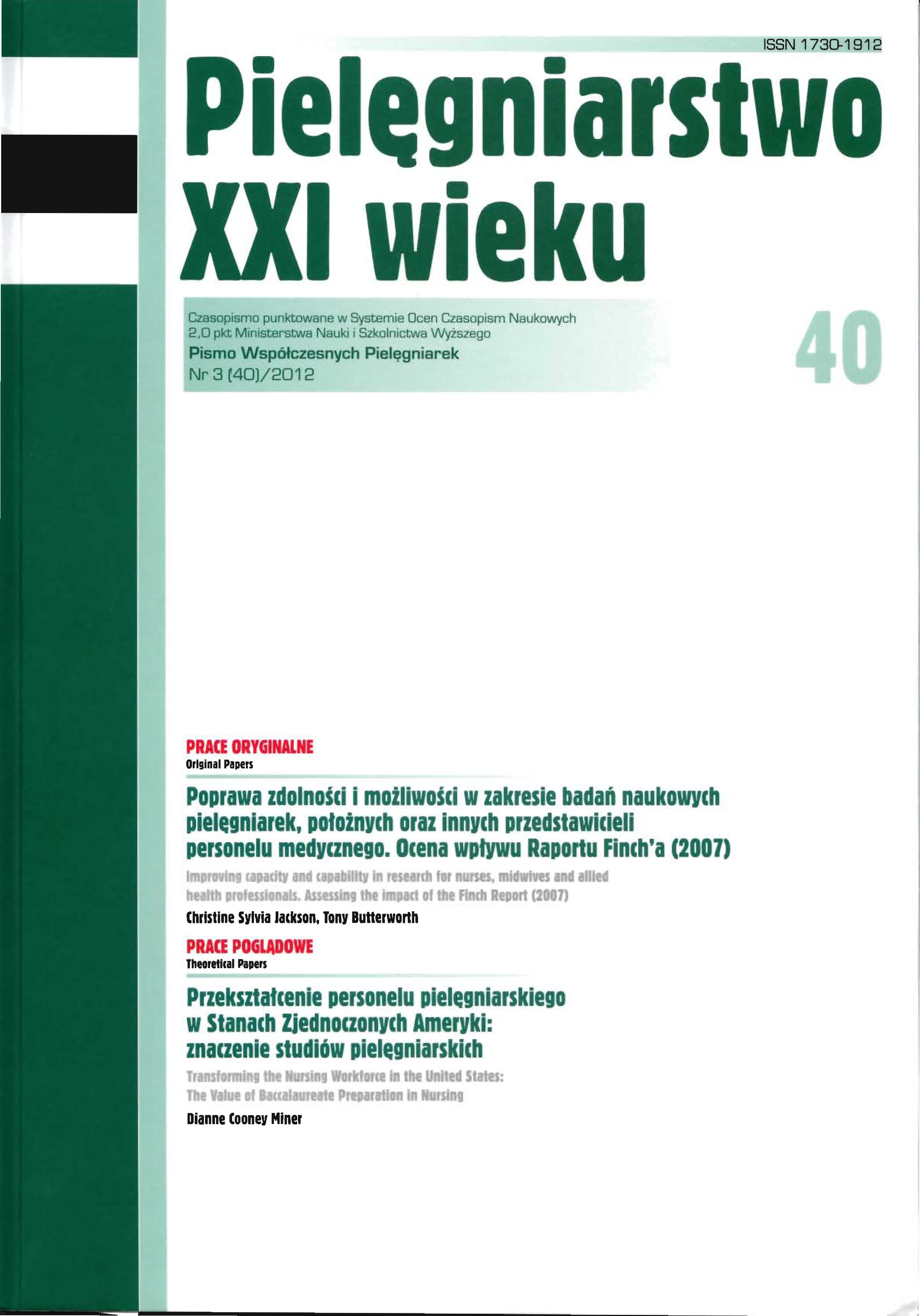The concept of personal and professional empowerment of nurses
Keywords:
nursing, empowerment, social skills, self-conceptAbstract
THE CONCEPT OF PERSONAL AND PROFESSIONAL EMPOWERMENT OF NURSES
Introduction. The response to the challenges of contemporary professional nursing practice in a time of intense social changes, scientific developments and multicultural environment requires a new quality of professional activities. In order to overcome the current decline in nursing profession, such as low competence for decision-making on the one hand and a high level requirements and high responsibilities on the other hand, the issue imposes the necessity of adopting the concept of personal and professional empowerment of nurses in the development and strengthening of professional identity and the preservation of professional autonomy.
Aim. To show the importance of adopting the concept of personal and professional empowerment of nurses, as well as developing and implementing programs in this field.
Methods: Descriptive analytical approach.
Results. The work summarizes the most important elements of professional competence in nursing, stressing the importance of developing an incentive program for the development of social skills, self-concept (self-esteem, self-acknowledgement), interculturalism, and continuous professional development, in order to involve the nursing into contemporary science and social activities.
Conclusions. With encouraging and investing in educational facilities of nursing profession the pre requirements have been created for an independent, versatile, competent, innovative and creative individuals to represent it. Professional identity of modern nursing could be built on foundations of broad social and professional skills, which is a prerequisite for serious work on building their own personality. The concept of personal and professional empowerment is the path to social, professional and moral development of nurses.
References
1. Zlatić L. Status koncepta komunikacione kompetencije u obrazovanju nastavnika. In: Knjiga rezimea Međunarodne naučne konferencije: Razvijanje komunikacionih kompetencija nastavnika i učenika; 2005: Jagodina, Serbija: Pedagoški fakultet u Jagodini; 2005, p. 112-113.
2. Department for Education and Skills UK. Social and Emotional aspects of learning Guidance; Curriculum and Standards. 2010 oct 28 [cited 2012 mar 22]. Avaible from: http://www.education.gov.uk/search/results?q=Social+and+emotional+aspects+of+ learning+Guidance
3. Opačić G. Ličnost u socijalnom ogledalu. 1st rev.ed. Beograd: Institut za pedagoška istraživanja; 1995.
4. Havelka N. Socijalna percepcija. 3rd rev.ed. Beograd: Zavod za udžbenike i nastavna sredstva; 2008.
5. Stanisavljević S, Kekuš D. Značaj samoshvatanja u profesionalnoj ulozi zdravstvenih radnika. In: Zbornik radova Simpozijuma zdravstvenih radnika Srbije sa međunarodnim učešćem; 2010: Zlatibor, Srbija: Savez udruženja zdravstvenih radnika Republike Srbije; 2010, p. 215-216.
6. Kararić D, Sindik J, Raguž V et al. Odnos zadovoljstva životom i psihološke dobrobiti sa stresom i mentalnom čvrstoćom kod studenata sestrinstva. Hrvatski časopis za javno zdravstvo. 2012 Jan 7; 8 (29): 35-48.
7. Petković M . Socijalne veštine i empatičnost kao komponente komunikacione kompetencije srednješkolskih nastavnika. Diplomski rad. Beograd: Filozofski fakultet; 1998.
8. Stanisavljević S. Značaj efikasne komunikacije u sestrinstvu. In: Zbornik radova Kongresa I kategorije zdravstvenih radnika Srbije sa međunarodnim učešćem; 2011: Zlatibor, Srbija: Savez udruženja zdravstvenih radnika Republike Srbije; 2011, p. 164 -165.
9. Bennett MJ. Towards Ethnorelativism: A Developmental Model of Intercultural Sensitivity in Paige. Education for the Intercultural Experience.Yarmouth: Intercultural Press; 1993.
10. Stanisavljević S, Kekuš D. Nastavnik zdravstvene nege u procesu multikulturalnog obrazovanja – uloga i kompetencije. In: Zbornik predavanja V Međunarodne naučne konferencije: Razvoj fokusa za sestrinstvo kroz bolje razumevanje i implementaciju bezbednosti,produktivnosti i unapređenju kvaliteta; 2011: Beograd, Srbija: Udruženje medicinskih sestara-tehničara Kliničkog centra Srbije ”Sestrinstvo”; 2011, p.123-128.
11. Ozimec Š. Motivacija medicinskih sestara u procesu kontinuirane edukacije. In: Zbornik radova 8. Konferencije medicinskih sestara sa međunarodnim učešćem: Perspektive individualnog i profesionalnog razvoja u sestrinstvu; 2008: Opatija, Hrvatska: Zdravstveno veleučilište u Zagrebu; 2008, p. 77-87.
12. Kekuš D. Komunikacije u profesionalnoj praksi zdravstvenih radnika. 2nd rev.ed. Beograd: Digital art; 2010.
13. Kalauz S. Bioetika u sestrinstvu. Medicina. 2008 Jun 30; 44 (2): 129-134.
Downloads
Published
Issue
Section
License
Copyright (c) 2012 Sanja Stanisavljevic, Divna Kekus, Zvonko Dimoski, Biljana Majstorovic, Dragica Stojanovic (Autor)

This work is licensed under a Creative Commons Attribution 4.0 International License.




